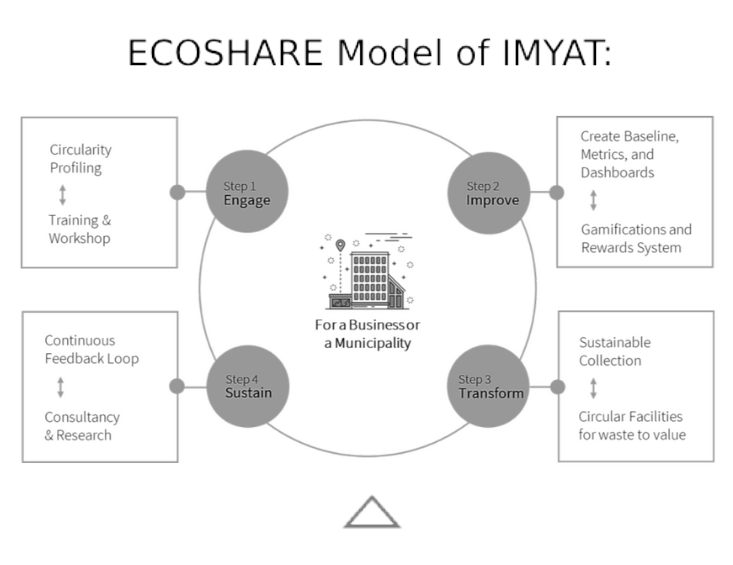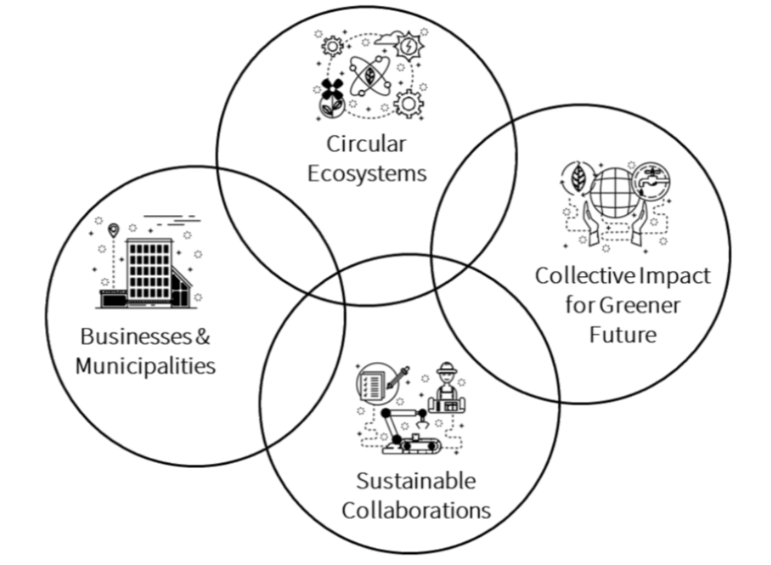


The global sustainability and circular economy market is valued at over $4.5 trillion and is expected to grow at a CAGR of 6-8% over the next decade. Increasing investment in sustainable technologies, renewable energy, and resource-efficient solutions is driving market growth.
ECOSHARE model of IMYAT is rooted in systems thinking, addressing the dynamic relationships between stakeholders, resources, and processes to achieve sustainability and advance the circular economy. Going beyond traditional waste management, it tackles root causes of challenges and aligns actions with long-term, system-wide benefits, creating adaptive and transformative strategies. By understanding the interconnectedness of systems, ECOSHARE empowers organizations to anticipate and mitigate unintended consequences, ensuring solutions are robust and future-ready.
Built on four pillars—Engage, Improve, Transform, and Sustain—the model integrates feedback loops and identifies leverage points for maximum impact. This comprehensive framework fosters collaboration among businesses and municipalities, leveraging data- driven insights and innovative practices to create measurable outcomes. With a focus on scalable and enduring solutions, ECOSHARE equips stakeholders to drive meaningful progress in sustainability, resource efficiency, and circular economy initiatives.



The global Technology is projected to reach $26.93 trillion by 2032, growing at a CAGR of 11.0% during the forecast period.
Key Drivers
Rapid Digital Transformation: Businesses across industries are accelerating the adoption of digital technologies to enhance efficiency and competitiveness.
Demand for AI and Data-Driven Solutions: Artificial Intelligence and data analytics are driving innovation in personalized customer experiences, predictive decision-making, and operational efficiency.
Emergence of Emerging Technologies: Breakthroughs in blockchain, IoT, 5G, and quantum computing are transforming industries and creating new opportunities for value creation.
Key Challenges:
Adapting to Rapid Technological Changes:
Staying ahead of the technology curve requires continuous investment in R&D and talent development.
Balancing Innovation with Practical Implementation: While innovation is essential, translating advanced technologies into cost-effective, scalable solutions can be challenging. Addressing Data Privacy and Security Concerns: Increased reliance on digital platforms raises concerns about data protection, cybersecurity, and regulatory compliance.


The global health and beauty industry is valued at $500+ billion, with a CAGR of 4-5%.
Key Drivers:
Rising demand for personalized solutions and sustainable products: Consumers increasingly seek tailored services and eco-friendly products that align with their values and lifestyles.
Accelerating digital transformation with AI-driven tools like virtual try-ons. AI and AR technologies have transformed customer engagement, offering interactive and data-driven shopping experiences.
Growing preference for organic and cruelty-free products. Ethical consumerism drives demand for products that are organic, cruelty-free, and sustainably sourced.
Key Challenges:
Adapting to changing consumer preferences. Rapidly shifting trends require businesses to stay agile and innovate to maintain relevance. Scaling digital capabilities for customer engagement. Businesses must invest in user-friendly digital ecosystems to meet the growing demand for personalized and seamless online experiences.
Retaining loyalty in a competitive market. With abundant options available, retaining customers requires personalized experiences and consistent value.

